Accor Hotel: Organizational Structure, Culture, and Change Management
VerifiedAdded on 2023/01/04
|12
|2962
|64
Report
AI Summary
This report provides a comprehensive analysis of Accor Hotel's management and organizational behavior. It begins with an introduction to management and organizational behavior, followed by an examination of Accor Hotel's organizational structure, including functional, network, and team-based structures, with a focus on the team-based approach. The report then delves into Accor's organizational culture, exploring clan, adhocracy, hierarchy, and market cultures, with a particular emphasis on the market culture adopted by Accor. Furthermore, the report details recent change initiatives undertaken by Accor Hotel, particularly in response to the COVID-19 pandemic, and assesses their impacts on health and safety, workflow, and international relations. It also explores how these changes are managed using the ADKAR change model. Finally, the report analyzes Accor Hotel's strategic direction, utilizing the Ansoff Matrix, and discusses its business performance, highlighting its diversification strategy and financial achievements. The report concludes with a summary of the key findings.
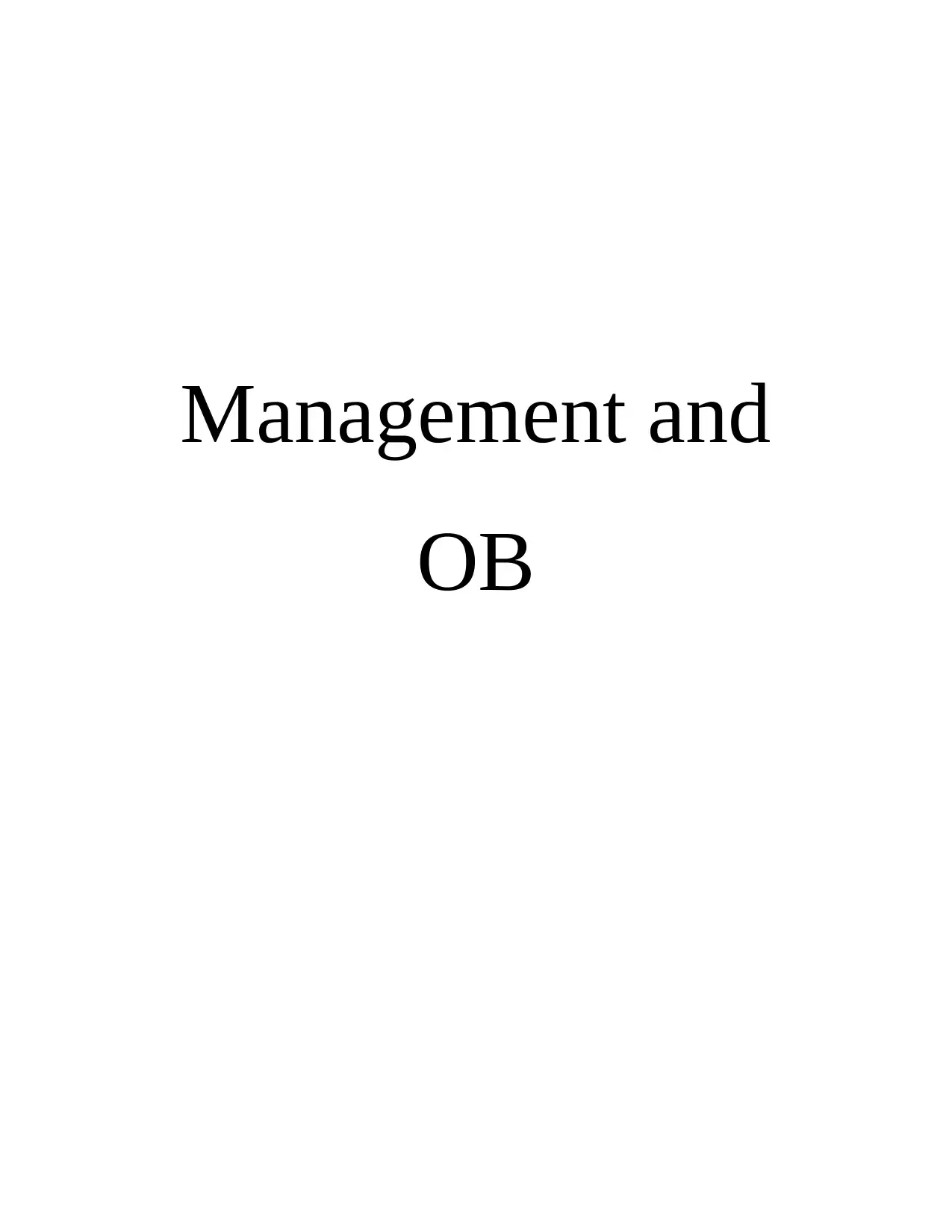
Management and
OB
OB
Paraphrase This Document
Need a fresh take? Get an instant paraphrase of this document with our AI Paraphraser
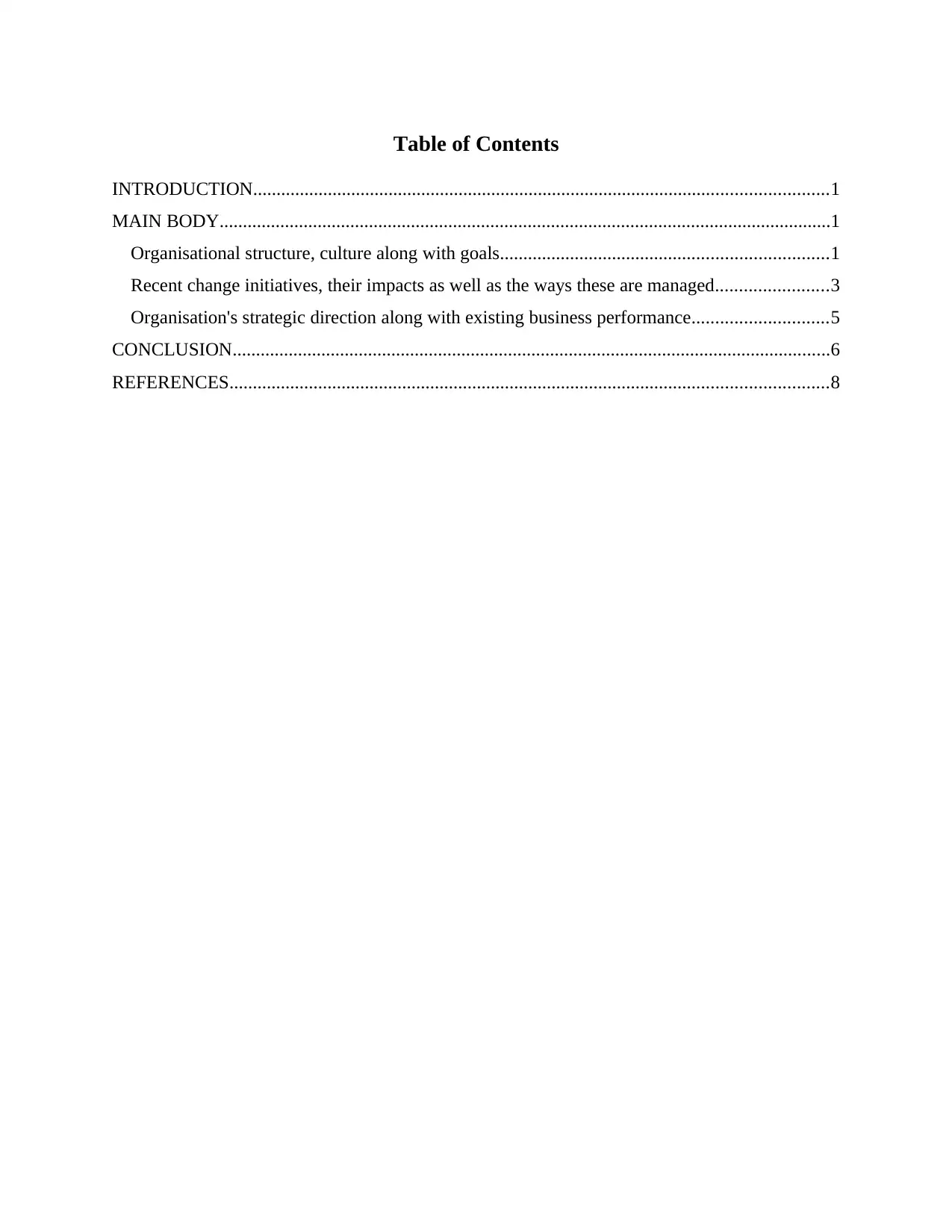
Table of Contents
INTRODUCTION...........................................................................................................................1
MAIN BODY...................................................................................................................................1
Organisational structure, culture along with goals......................................................................1
Recent change initiatives, their impacts as well as the ways these are managed........................3
Organisation's strategic direction along with existing business performance.............................5
CONCLUSION................................................................................................................................6
REFERENCES................................................................................................................................8
INTRODUCTION...........................................................................................................................1
MAIN BODY...................................................................................................................................1
Organisational structure, culture along with goals......................................................................1
Recent change initiatives, their impacts as well as the ways these are managed........................3
Organisation's strategic direction along with existing business performance.............................5
CONCLUSION................................................................................................................................6
REFERENCES................................................................................................................................8

⊘ This is a preview!⊘
Do you want full access?
Subscribe today to unlock all pages.

Trusted by 1+ million students worldwide
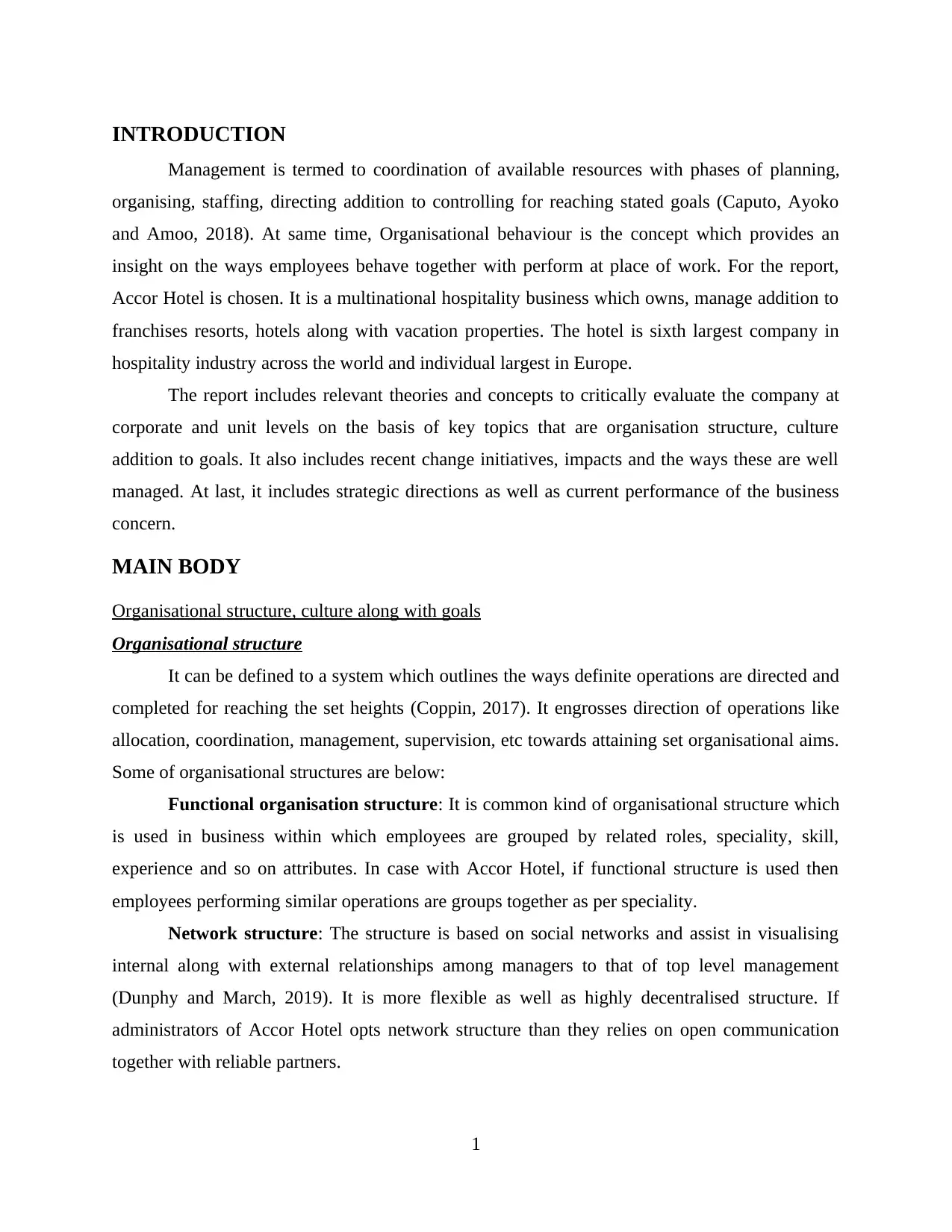
INTRODUCTION
Management is termed to coordination of available resources with phases of planning,
organising, staffing, directing addition to controlling for reaching stated goals (Caputo, Ayoko
and Amoo, 2018). At same time, Organisational behaviour is the concept which provides an
insight on the ways employees behave together with perform at place of work. For the report,
Accor Hotel is chosen. It is a multinational hospitality business which owns, manage addition to
franchises resorts, hotels along with vacation properties. The hotel is sixth largest company in
hospitality industry across the world and individual largest in Europe.
The report includes relevant theories and concepts to critically evaluate the company at
corporate and unit levels on the basis of key topics that are organisation structure, culture
addition to goals. It also includes recent change initiatives, impacts and the ways these are well
managed. At last, it includes strategic directions as well as current performance of the business
concern.
MAIN BODY
Organisational structure, culture along with goals
Organisational structure
It can be defined to a system which outlines the ways definite operations are directed and
completed for reaching the set heights (Coppin, 2017). It engrosses direction of operations like
allocation, coordination, management, supervision, etc towards attaining set organisational aims.
Some of organisational structures are below:
Functional organisation structure: It is common kind of organisational structure which
is used in business within which employees are grouped by related roles, speciality, skill,
experience and so on attributes. In case with Accor Hotel, if functional structure is used then
employees performing similar operations are groups together as per speciality.
Network structure: The structure is based on social networks and assist in visualising
internal along with external relationships among managers to that of top level management
(Dunphy and March, 2019). It is more flexible as well as highly decentralised structure. If
administrators of Accor Hotel opts network structure than they relies on open communication
together with reliable partners.
1
Management is termed to coordination of available resources with phases of planning,
organising, staffing, directing addition to controlling for reaching stated goals (Caputo, Ayoko
and Amoo, 2018). At same time, Organisational behaviour is the concept which provides an
insight on the ways employees behave together with perform at place of work. For the report,
Accor Hotel is chosen. It is a multinational hospitality business which owns, manage addition to
franchises resorts, hotels along with vacation properties. The hotel is sixth largest company in
hospitality industry across the world and individual largest in Europe.
The report includes relevant theories and concepts to critically evaluate the company at
corporate and unit levels on the basis of key topics that are organisation structure, culture
addition to goals. It also includes recent change initiatives, impacts and the ways these are well
managed. At last, it includes strategic directions as well as current performance of the business
concern.
MAIN BODY
Organisational structure, culture along with goals
Organisational structure
It can be defined to a system which outlines the ways definite operations are directed and
completed for reaching the set heights (Coppin, 2017). It engrosses direction of operations like
allocation, coordination, management, supervision, etc towards attaining set organisational aims.
Some of organisational structures are below:
Functional organisation structure: It is common kind of organisational structure which
is used in business within which employees are grouped by related roles, speciality, skill,
experience and so on attributes. In case with Accor Hotel, if functional structure is used then
employees performing similar operations are groups together as per speciality.
Network structure: The structure is based on social networks and assist in visualising
internal along with external relationships among managers to that of top level management
(Dunphy and March, 2019). It is more flexible as well as highly decentralised structure. If
administrators of Accor Hotel opts network structure than they relies on open communication
together with reliable partners.
1
Paraphrase This Document
Need a fresh take? Get an instant paraphrase of this document with our AI Paraphraser
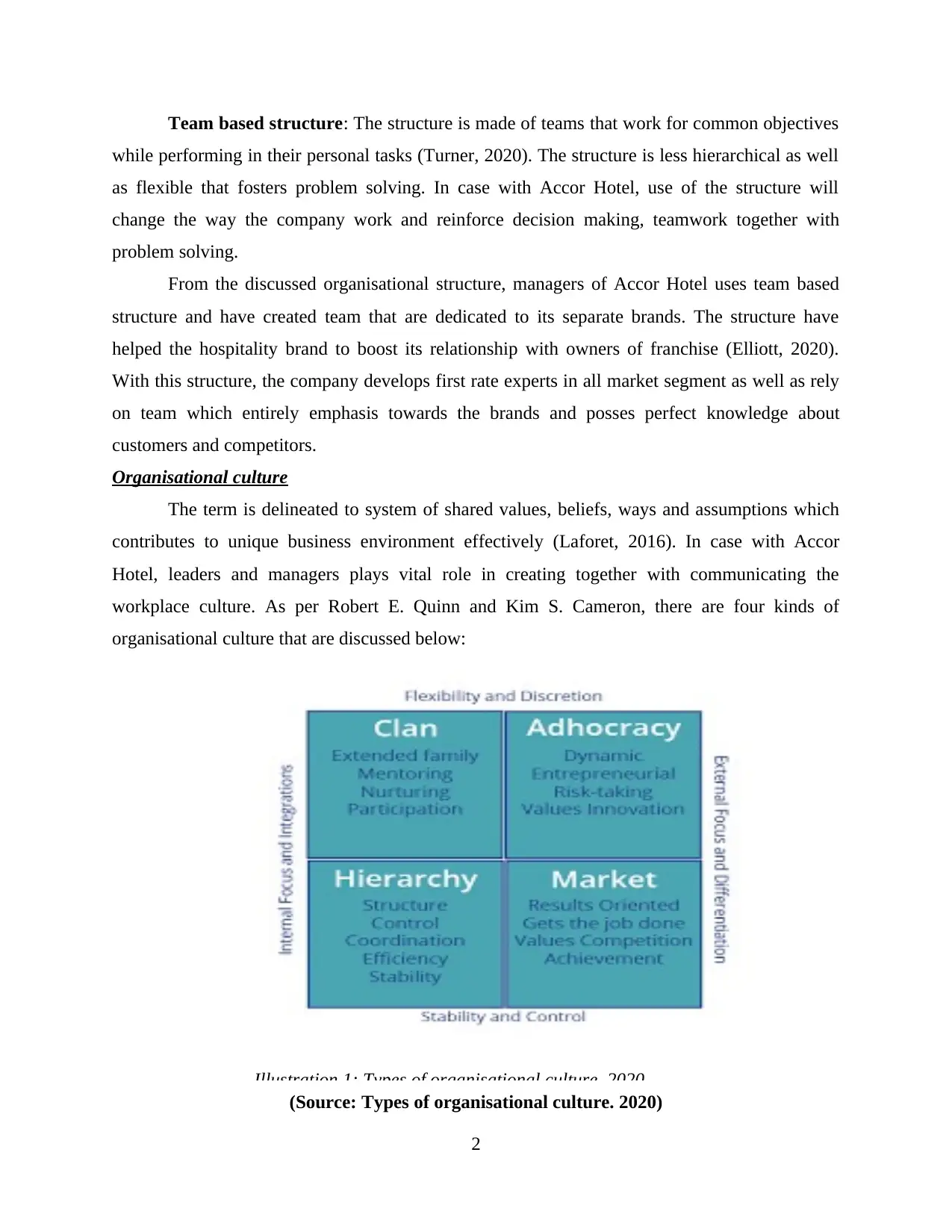
Team based structure: The structure is made of teams that work for common objectives
while performing in their personal tasks (Turner, 2020). The structure is less hierarchical as well
as flexible that fosters problem solving. In case with Accor Hotel, use of the structure will
change the way the company work and reinforce decision making, teamwork together with
problem solving.
From the discussed organisational structure, managers of Accor Hotel uses team based
structure and have created team that are dedicated to its separate brands. The structure have
helped the hospitality brand to boost its relationship with owners of franchise (Elliott, 2020).
With this structure, the company develops first rate experts in all market segment as well as rely
on team which entirely emphasis towards the brands and posses perfect knowledge about
customers and competitors.
Organisational culture
The term is delineated to system of shared values, beliefs, ways and assumptions which
contributes to unique business environment effectively (Laforet, 2016). In case with Accor
Hotel, leaders and managers plays vital role in creating together with communicating the
workplace culture. As per Robert E. Quinn and Kim S. Cameron, there are four kinds of
organisational culture that are discussed below:
Illustration 1: Types of organisational culture. 2020
(Source: Types of organisational culture. 2020)
2
while performing in their personal tasks (Turner, 2020). The structure is less hierarchical as well
as flexible that fosters problem solving. In case with Accor Hotel, use of the structure will
change the way the company work and reinforce decision making, teamwork together with
problem solving.
From the discussed organisational structure, managers of Accor Hotel uses team based
structure and have created team that are dedicated to its separate brands. The structure have
helped the hospitality brand to boost its relationship with owners of franchise (Elliott, 2020).
With this structure, the company develops first rate experts in all market segment as well as rely
on team which entirely emphasis towards the brands and posses perfect knowledge about
customers and competitors.
Organisational culture
The term is delineated to system of shared values, beliefs, ways and assumptions which
contributes to unique business environment effectively (Laforet, 2016). In case with Accor
Hotel, leaders and managers plays vital role in creating together with communicating the
workplace culture. As per Robert E. Quinn and Kim S. Cameron, there are four kinds of
organisational culture that are discussed below:
Illustration 1: Types of organisational culture. 2020
(Source: Types of organisational culture. 2020)
2
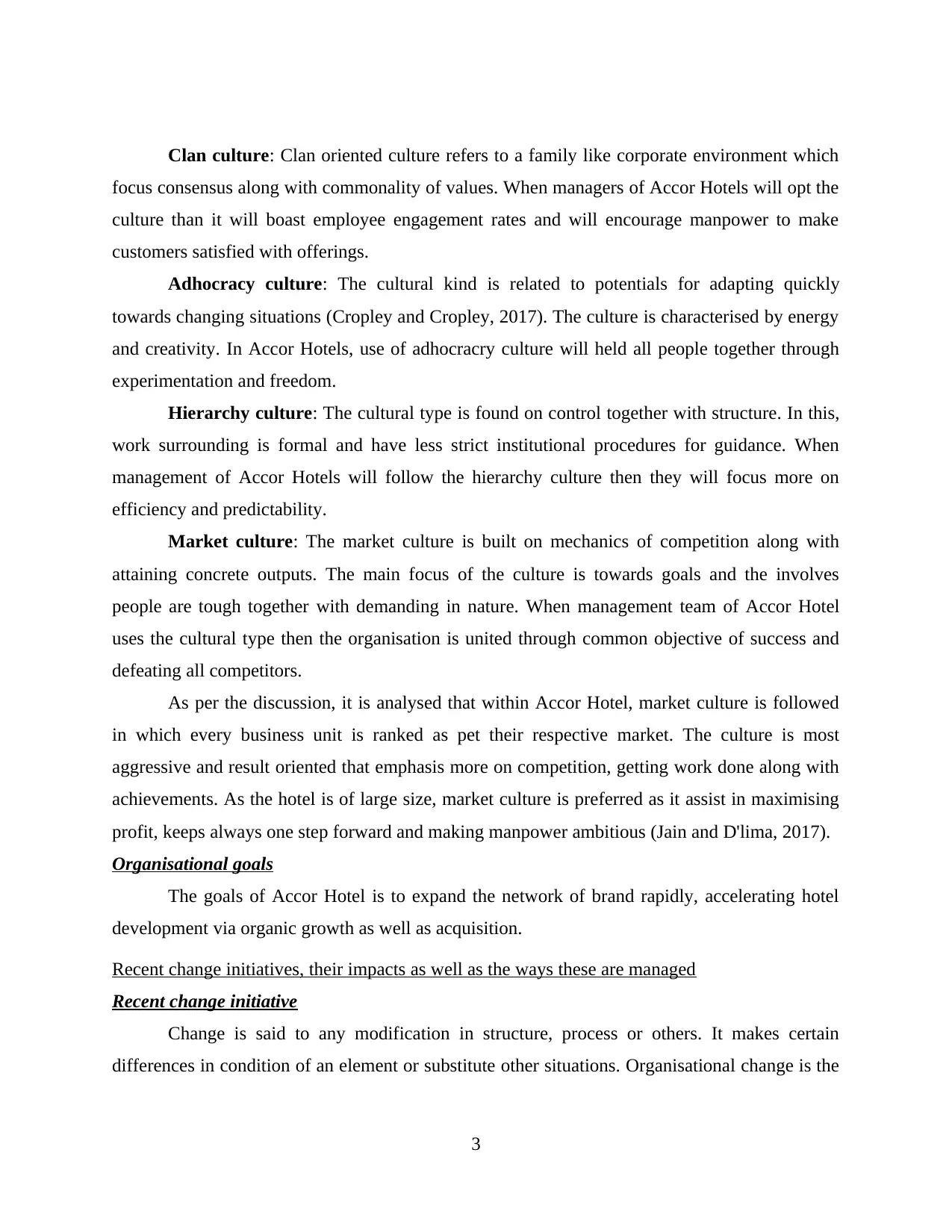
Clan culture: Clan oriented culture refers to a family like corporate environment which
focus consensus along with commonality of values. When managers of Accor Hotels will opt the
culture than it will boast employee engagement rates and will encourage manpower to make
customers satisfied with offerings.
Adhocracy culture: The cultural kind is related to potentials for adapting quickly
towards changing situations (Cropley and Cropley, 2017). The culture is characterised by energy
and creativity. In Accor Hotels, use of adhocracry culture will held all people together through
experimentation and freedom.
Hierarchy culture: The cultural type is found on control together with structure. In this,
work surrounding is formal and have less strict institutional procedures for guidance. When
management of Accor Hotels will follow the hierarchy culture then they will focus more on
efficiency and predictability.
Market culture: The market culture is built on mechanics of competition along with
attaining concrete outputs. The main focus of the culture is towards goals and the involves
people are tough together with demanding in nature. When management team of Accor Hotel
uses the cultural type then the organisation is united through common objective of success and
defeating all competitors.
As per the discussion, it is analysed that within Accor Hotel, market culture is followed
in which every business unit is ranked as pet their respective market. The culture is most
aggressive and result oriented that emphasis more on competition, getting work done along with
achievements. As the hotel is of large size, market culture is preferred as it assist in maximising
profit, keeps always one step forward and making manpower ambitious (Jain and D'lima, 2017).
Organisational goals
The goals of Accor Hotel is to expand the network of brand rapidly, accelerating hotel
development via organic growth as well as acquisition.
Recent change initiatives, their impacts as well as the ways these are managed
Recent change initiative
Change is said to any modification in structure, process or others. It makes certain
differences in condition of an element or substitute other situations. Organisational change is the
3
focus consensus along with commonality of values. When managers of Accor Hotels will opt the
culture than it will boast employee engagement rates and will encourage manpower to make
customers satisfied with offerings.
Adhocracy culture: The cultural kind is related to potentials for adapting quickly
towards changing situations (Cropley and Cropley, 2017). The culture is characterised by energy
and creativity. In Accor Hotels, use of adhocracry culture will held all people together through
experimentation and freedom.
Hierarchy culture: The cultural type is found on control together with structure. In this,
work surrounding is formal and have less strict institutional procedures for guidance. When
management of Accor Hotels will follow the hierarchy culture then they will focus more on
efficiency and predictability.
Market culture: The market culture is built on mechanics of competition along with
attaining concrete outputs. The main focus of the culture is towards goals and the involves
people are tough together with demanding in nature. When management team of Accor Hotel
uses the cultural type then the organisation is united through common objective of success and
defeating all competitors.
As per the discussion, it is analysed that within Accor Hotel, market culture is followed
in which every business unit is ranked as pet their respective market. The culture is most
aggressive and result oriented that emphasis more on competition, getting work done along with
achievements. As the hotel is of large size, market culture is preferred as it assist in maximising
profit, keeps always one step forward and making manpower ambitious (Jain and D'lima, 2017).
Organisational goals
The goals of Accor Hotel is to expand the network of brand rapidly, accelerating hotel
development via organic growth as well as acquisition.
Recent change initiatives, their impacts as well as the ways these are managed
Recent change initiative
Change is said to any modification in structure, process or others. It makes certain
differences in condition of an element or substitute other situations. Organisational change is the
3
⊘ This is a preview!⊘
Do you want full access?
Subscribe today to unlock all pages.

Trusted by 1+ million students worldwide
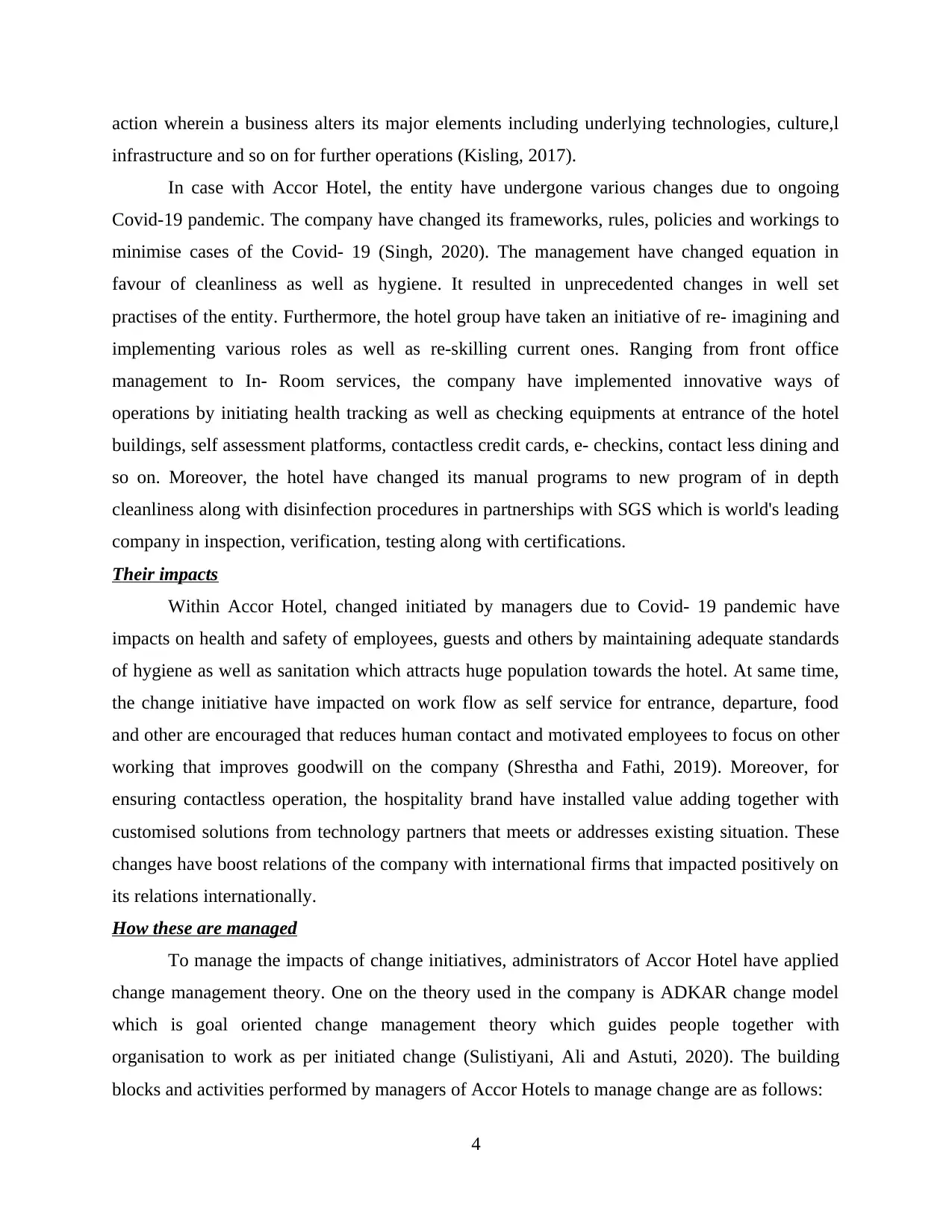
action wherein a business alters its major elements including underlying technologies, culture,l
infrastructure and so on for further operations (Kisling, 2017).
In case with Accor Hotel, the entity have undergone various changes due to ongoing
Covid-19 pandemic. The company have changed its frameworks, rules, policies and workings to
minimise cases of the Covid- 19 (Singh, 2020). The management have changed equation in
favour of cleanliness as well as hygiene. It resulted in unprecedented changes in well set
practises of the entity. Furthermore, the hotel group have taken an initiative of re- imagining and
implementing various roles as well as re-skilling current ones. Ranging from front office
management to In- Room services, the company have implemented innovative ways of
operations by initiating health tracking as well as checking equipments at entrance of the hotel
buildings, self assessment platforms, contactless credit cards, e- checkins, contact less dining and
so on. Moreover, the hotel have changed its manual programs to new program of in depth
cleanliness along with disinfection procedures in partnerships with SGS which is world's leading
company in inspection, verification, testing along with certifications.
Their impacts
Within Accor Hotel, changed initiated by managers due to Covid- 19 pandemic have
impacts on health and safety of employees, guests and others by maintaining adequate standards
of hygiene as well as sanitation which attracts huge population towards the hotel. At same time,
the change initiative have impacted on work flow as self service for entrance, departure, food
and other are encouraged that reduces human contact and motivated employees to focus on other
working that improves goodwill on the company (Shrestha and Fathi, 2019). Moreover, for
ensuring contactless operation, the hospitality brand have installed value adding together with
customised solutions from technology partners that meets or addresses existing situation. These
changes have boost relations of the company with international firms that impacted positively on
its relations internationally.
How these are managed
To manage the impacts of change initiatives, administrators of Accor Hotel have applied
change management theory. One on the theory used in the company is ADKAR change model
which is goal oriented change management theory which guides people together with
organisation to work as per initiated change (Sulistiyani, Ali and Astuti, 2020). The building
blocks and activities performed by managers of Accor Hotels to manage change are as follows:
4
infrastructure and so on for further operations (Kisling, 2017).
In case with Accor Hotel, the entity have undergone various changes due to ongoing
Covid-19 pandemic. The company have changed its frameworks, rules, policies and workings to
minimise cases of the Covid- 19 (Singh, 2020). The management have changed equation in
favour of cleanliness as well as hygiene. It resulted in unprecedented changes in well set
practises of the entity. Furthermore, the hotel group have taken an initiative of re- imagining and
implementing various roles as well as re-skilling current ones. Ranging from front office
management to In- Room services, the company have implemented innovative ways of
operations by initiating health tracking as well as checking equipments at entrance of the hotel
buildings, self assessment platforms, contactless credit cards, e- checkins, contact less dining and
so on. Moreover, the hotel have changed its manual programs to new program of in depth
cleanliness along with disinfection procedures in partnerships with SGS which is world's leading
company in inspection, verification, testing along with certifications.
Their impacts
Within Accor Hotel, changed initiated by managers due to Covid- 19 pandemic have
impacts on health and safety of employees, guests and others by maintaining adequate standards
of hygiene as well as sanitation which attracts huge population towards the hotel. At same time,
the change initiative have impacted on work flow as self service for entrance, departure, food
and other are encouraged that reduces human contact and motivated employees to focus on other
working that improves goodwill on the company (Shrestha and Fathi, 2019). Moreover, for
ensuring contactless operation, the hospitality brand have installed value adding together with
customised solutions from technology partners that meets or addresses existing situation. These
changes have boost relations of the company with international firms that impacted positively on
its relations internationally.
How these are managed
To manage the impacts of change initiatives, administrators of Accor Hotel have applied
change management theory. One on the theory used in the company is ADKAR change model
which is goal oriented change management theory which guides people together with
organisation to work as per initiated change (Sulistiyani, Ali and Astuti, 2020). The building
blocks and activities performed by managers of Accor Hotels to manage change are as follows:
4
Paraphrase This Document
Need a fresh take? Get an instant paraphrase of this document with our AI Paraphraser
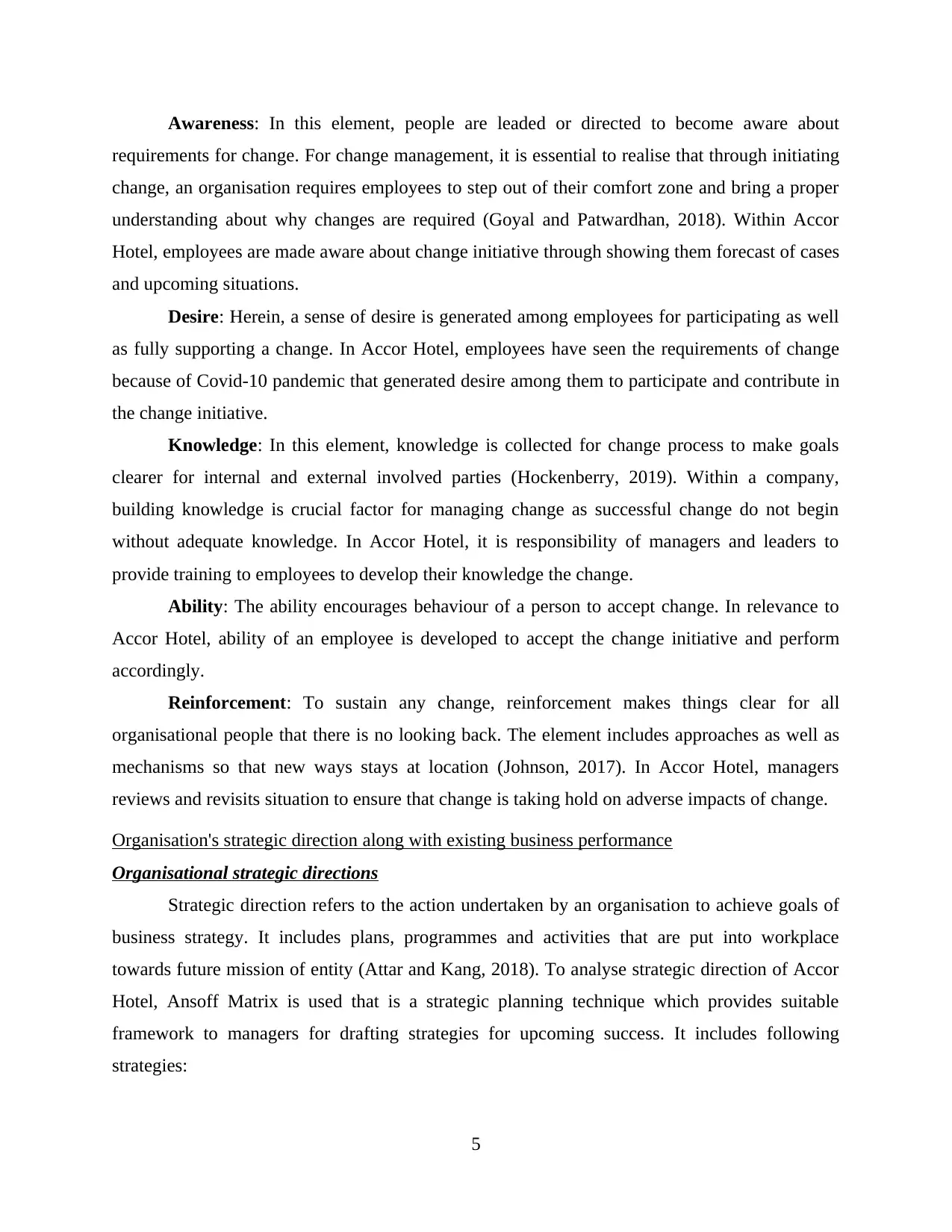
Awareness: In this element, people are leaded or directed to become aware about
requirements for change. For change management, it is essential to realise that through initiating
change, an organisation requires employees to step out of their comfort zone and bring a proper
understanding about why changes are required (Goyal and Patwardhan, 2018). Within Accor
Hotel, employees are made aware about change initiative through showing them forecast of cases
and upcoming situations.
Desire: Herein, a sense of desire is generated among employees for participating as well
as fully supporting a change. In Accor Hotel, employees have seen the requirements of change
because of Covid-10 pandemic that generated desire among them to participate and contribute in
the change initiative.
Knowledge: In this element, knowledge is collected for change process to make goals
clearer for internal and external involved parties (Hockenberry, 2019). Within a company,
building knowledge is crucial factor for managing change as successful change do not begin
without adequate knowledge. In Accor Hotel, it is responsibility of managers and leaders to
provide training to employees to develop their knowledge the change.
Ability: The ability encourages behaviour of a person to accept change. In relevance to
Accor Hotel, ability of an employee is developed to accept the change initiative and perform
accordingly.
Reinforcement: To sustain any change, reinforcement makes things clear for all
organisational people that there is no looking back. The element includes approaches as well as
mechanisms so that new ways stays at location (Johnson, 2017). In Accor Hotel, managers
reviews and revisits situation to ensure that change is taking hold on adverse impacts of change.
Organisation's strategic direction along with existing business performance
Organisational strategic directions
Strategic direction refers to the action undertaken by an organisation to achieve goals of
business strategy. It includes plans, programmes and activities that are put into workplace
towards future mission of entity (Attar and Kang, 2018). To analyse strategic direction of Accor
Hotel, Ansoff Matrix is used that is a strategic planning technique which provides suitable
framework to managers for drafting strategies for upcoming success. It includes following
strategies:
5
requirements for change. For change management, it is essential to realise that through initiating
change, an organisation requires employees to step out of their comfort zone and bring a proper
understanding about why changes are required (Goyal and Patwardhan, 2018). Within Accor
Hotel, employees are made aware about change initiative through showing them forecast of cases
and upcoming situations.
Desire: Herein, a sense of desire is generated among employees for participating as well
as fully supporting a change. In Accor Hotel, employees have seen the requirements of change
because of Covid-10 pandemic that generated desire among them to participate and contribute in
the change initiative.
Knowledge: In this element, knowledge is collected for change process to make goals
clearer for internal and external involved parties (Hockenberry, 2019). Within a company,
building knowledge is crucial factor for managing change as successful change do not begin
without adequate knowledge. In Accor Hotel, it is responsibility of managers and leaders to
provide training to employees to develop their knowledge the change.
Ability: The ability encourages behaviour of a person to accept change. In relevance to
Accor Hotel, ability of an employee is developed to accept the change initiative and perform
accordingly.
Reinforcement: To sustain any change, reinforcement makes things clear for all
organisational people that there is no looking back. The element includes approaches as well as
mechanisms so that new ways stays at location (Johnson, 2017). In Accor Hotel, managers
reviews and revisits situation to ensure that change is taking hold on adverse impacts of change.
Organisation's strategic direction along with existing business performance
Organisational strategic directions
Strategic direction refers to the action undertaken by an organisation to achieve goals of
business strategy. It includes plans, programmes and activities that are put into workplace
towards future mission of entity (Attar and Kang, 2018). To analyse strategic direction of Accor
Hotel, Ansoff Matrix is used that is a strategic planning technique which provides suitable
framework to managers for drafting strategies for upcoming success. It includes following
strategies:
5
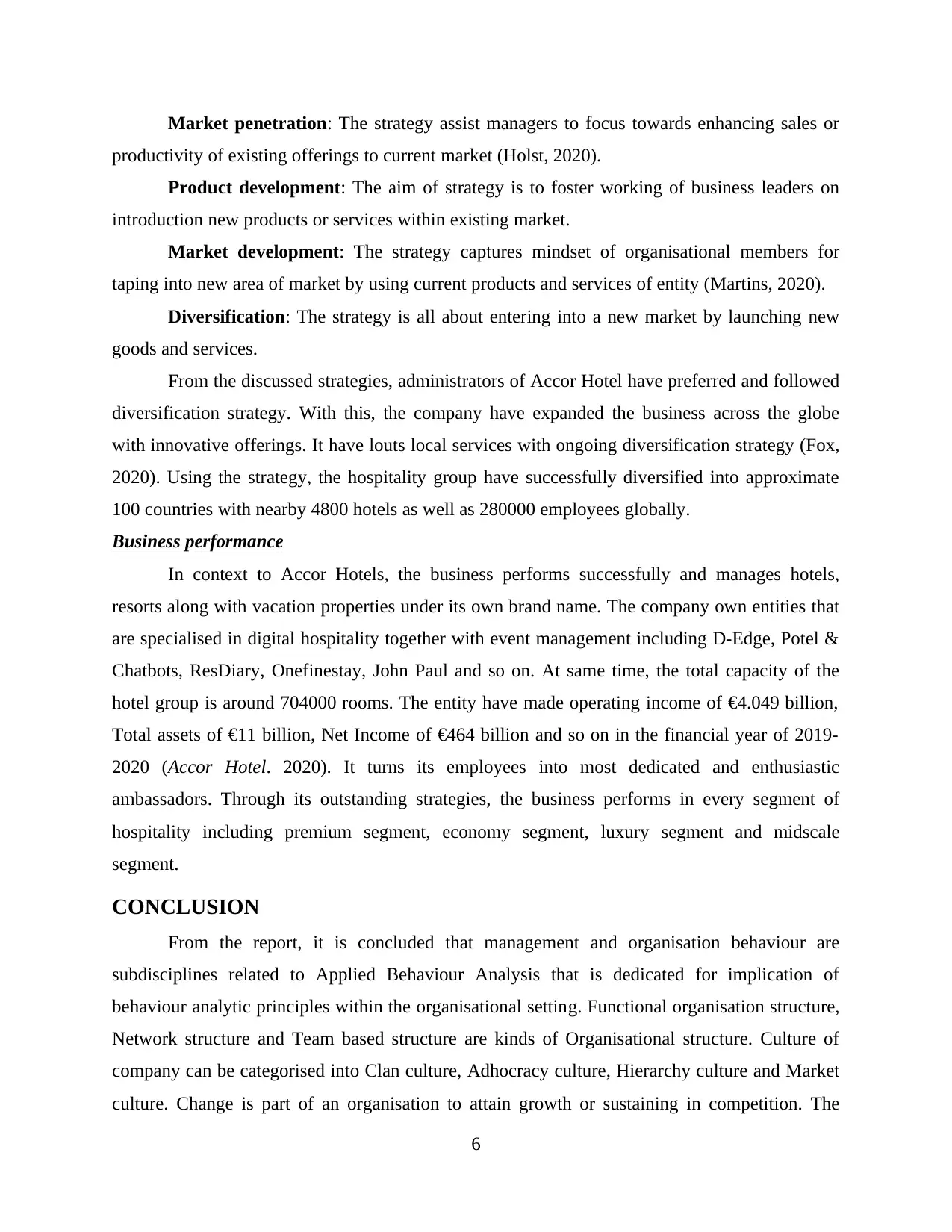
Market penetration: The strategy assist managers to focus towards enhancing sales or
productivity of existing offerings to current market (Holst, 2020).
Product development: The aim of strategy is to foster working of business leaders on
introduction new products or services within existing market.
Market development: The strategy captures mindset of organisational members for
taping into new area of market by using current products and services of entity (Martins, 2020).
Diversification: The strategy is all about entering into a new market by launching new
goods and services.
From the discussed strategies, administrators of Accor Hotel have preferred and followed
diversification strategy. With this, the company have expanded the business across the globe
with innovative offerings. It have louts local services with ongoing diversification strategy (Fox,
2020). Using the strategy, the hospitality group have successfully diversified into approximate
100 countries with nearby 4800 hotels as well as 280000 employees globally.
Business performance
In context to Accor Hotels, the business performs successfully and manages hotels,
resorts along with vacation properties under its own brand name. The company own entities that
are specialised in digital hospitality together with event management including D-Edge, Potel &
Chatbots, ResDiary, Onefinestay, John Paul and so on. At same time, the total capacity of the
hotel group is around 704000 rooms. The entity have made operating income of €4.049 billion,
Total assets of €11 billion, Net Income of €464 billion and so on in the financial year of 2019-
2020 (Accor Hotel. 2020). It turns its employees into most dedicated and enthusiastic
ambassadors. Through its outstanding strategies, the business performs in every segment of
hospitality including premium segment, economy segment, luxury segment and midscale
segment.
CONCLUSION
From the report, it is concluded that management and organisation behaviour are
subdisciplines related to Applied Behaviour Analysis that is dedicated for implication of
behaviour analytic principles within the organisational setting. Functional organisation structure,
Network structure and Team based structure are kinds of Organisational structure. Culture of
company can be categorised into Clan culture, Adhocracy culture, Hierarchy culture and Market
culture. Change is part of an organisation to attain growth or sustaining in competition. The
6
productivity of existing offerings to current market (Holst, 2020).
Product development: The aim of strategy is to foster working of business leaders on
introduction new products or services within existing market.
Market development: The strategy captures mindset of organisational members for
taping into new area of market by using current products and services of entity (Martins, 2020).
Diversification: The strategy is all about entering into a new market by launching new
goods and services.
From the discussed strategies, administrators of Accor Hotel have preferred and followed
diversification strategy. With this, the company have expanded the business across the globe
with innovative offerings. It have louts local services with ongoing diversification strategy (Fox,
2020). Using the strategy, the hospitality group have successfully diversified into approximate
100 countries with nearby 4800 hotels as well as 280000 employees globally.
Business performance
In context to Accor Hotels, the business performs successfully and manages hotels,
resorts along with vacation properties under its own brand name. The company own entities that
are specialised in digital hospitality together with event management including D-Edge, Potel &
Chatbots, ResDiary, Onefinestay, John Paul and so on. At same time, the total capacity of the
hotel group is around 704000 rooms. The entity have made operating income of €4.049 billion,
Total assets of €11 billion, Net Income of €464 billion and so on in the financial year of 2019-
2020 (Accor Hotel. 2020). It turns its employees into most dedicated and enthusiastic
ambassadors. Through its outstanding strategies, the business performs in every segment of
hospitality including premium segment, economy segment, luxury segment and midscale
segment.
CONCLUSION
From the report, it is concluded that management and organisation behaviour are
subdisciplines related to Applied Behaviour Analysis that is dedicated for implication of
behaviour analytic principles within the organisational setting. Functional organisation structure,
Network structure and Team based structure are kinds of Organisational structure. Culture of
company can be categorised into Clan culture, Adhocracy culture, Hierarchy culture and Market
culture. Change is part of an organisation to attain growth or sustaining in competition. The
6
⊘ This is a preview!⊘
Do you want full access?
Subscribe today to unlock all pages.

Trusted by 1+ million students worldwide
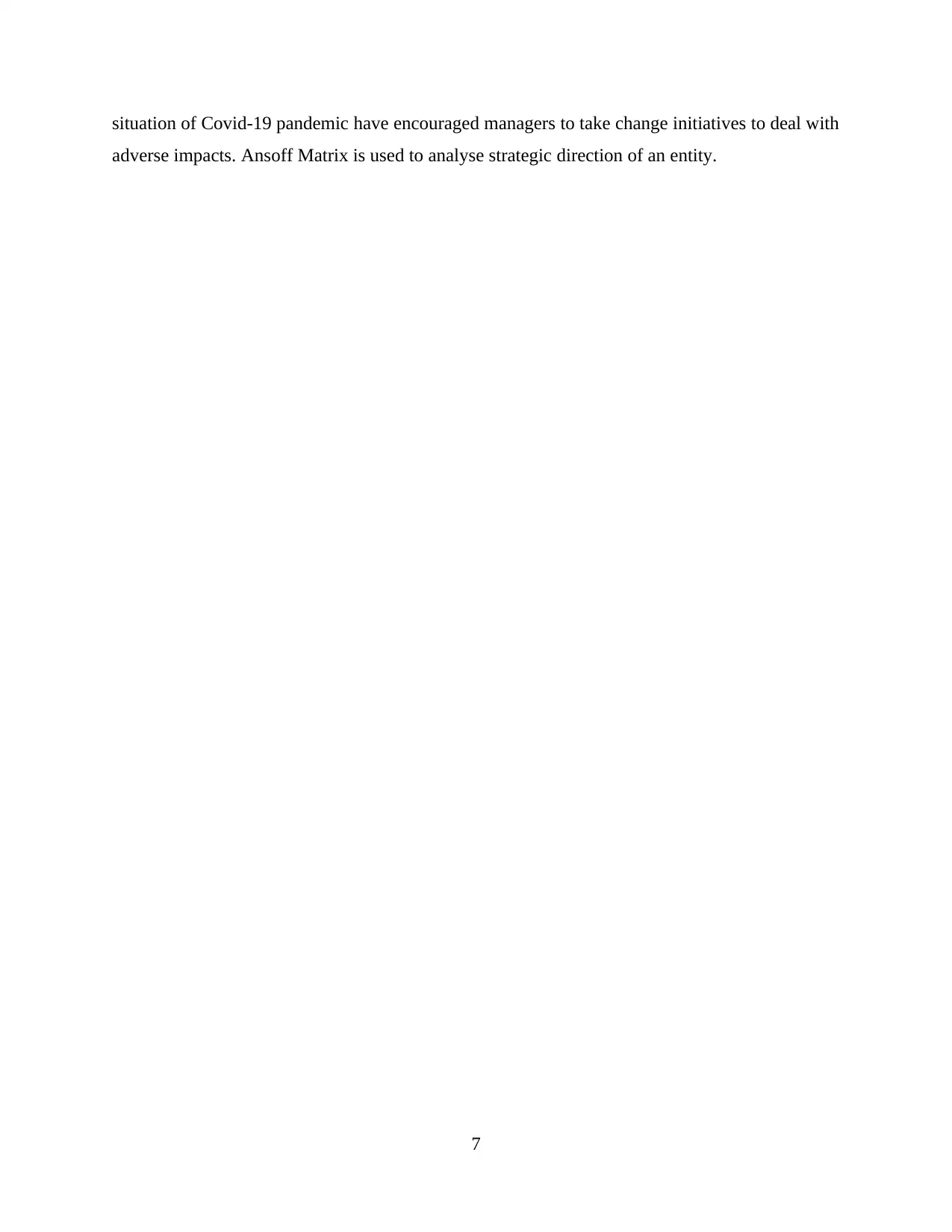
situation of Covid-19 pandemic have encouraged managers to take change initiatives to deal with
adverse impacts. Ansoff Matrix is used to analyse strategic direction of an entity.
7
adverse impacts. Ansoff Matrix is used to analyse strategic direction of an entity.
7
Paraphrase This Document
Need a fresh take? Get an instant paraphrase of this document with our AI Paraphraser
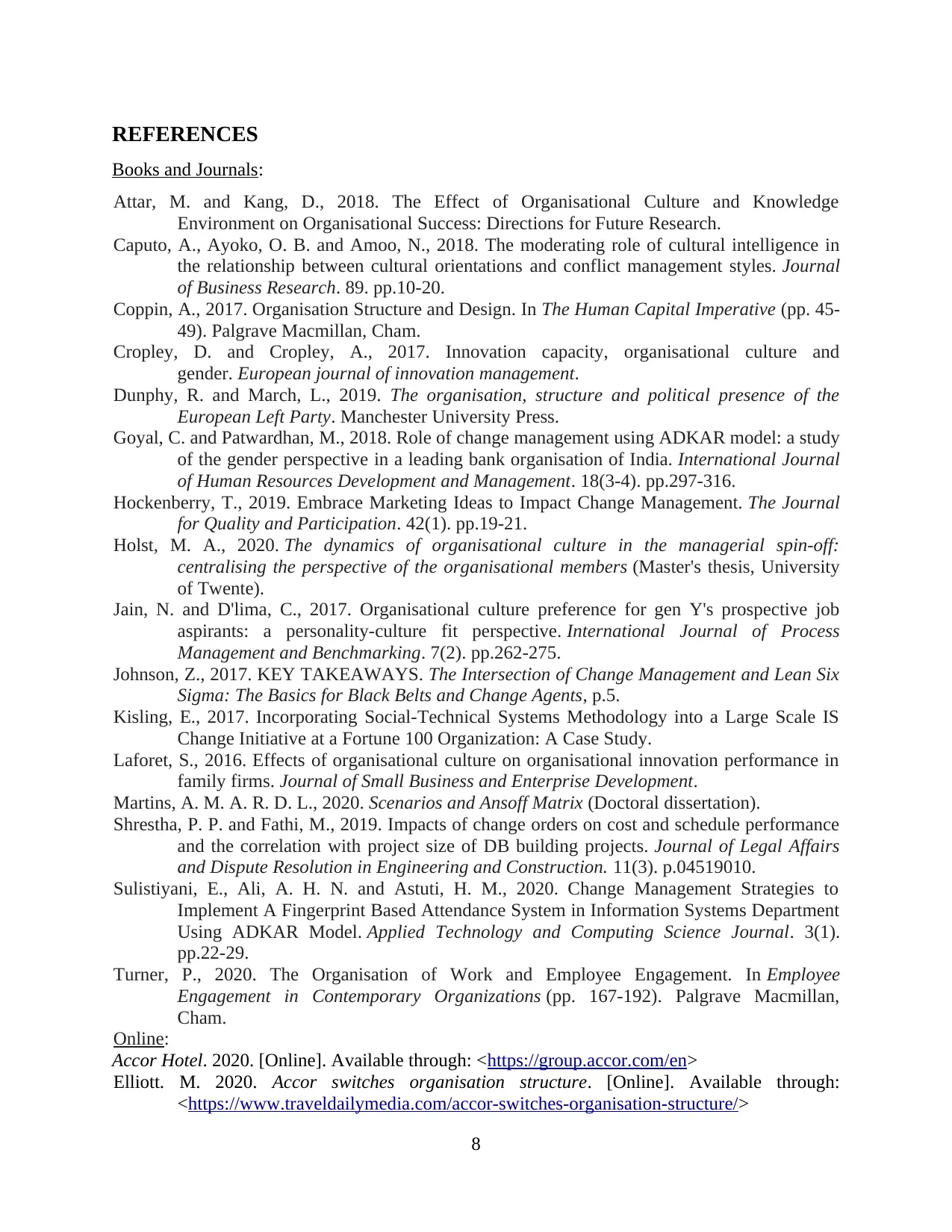
REFERENCES
Books and Journals:
Attar, M. and Kang, D., 2018. The Effect of Organisational Culture and Knowledge
Environment on Organisational Success: Directions for Future Research.
Caputo, A., Ayoko, O. B. and Amoo, N., 2018. The moderating role of cultural intelligence in
the relationship between cultural orientations and conflict management styles. Journal
of Business Research. 89. pp.10-20.
Coppin, A., 2017. Organisation Structure and Design. In The Human Capital Imperative (pp. 45-
49). Palgrave Macmillan, Cham.
Cropley, D. and Cropley, A., 2017. Innovation capacity, organisational culture and
gender. European journal of innovation management.
Dunphy, R. and March, L., 2019. The organisation, structure and political presence of the
European Left Party. Manchester University Press.
Goyal, C. and Patwardhan, M., 2018. Role of change management using ADKAR model: a study
of the gender perspective in a leading bank organisation of India. International Journal
of Human Resources Development and Management. 18(3-4). pp.297-316.
Hockenberry, T., 2019. Embrace Marketing Ideas to Impact Change Management. The Journal
for Quality and Participation. 42(1). pp.19-21.
Holst, M. A., 2020. The dynamics of organisational culture in the managerial spin-off:
centralising the perspective of the organisational members (Master's thesis, University
of Twente).
Jain, N. and D'lima, C., 2017. Organisational culture preference for gen Y's prospective job
aspirants: a personality-culture fit perspective. International Journal of Process
Management and Benchmarking. 7(2). pp.262-275.
Johnson, Z., 2017. KEY TAKEAWAYS. The Intersection of Change Management and Lean Six
Sigma: The Basics for Black Belts and Change Agents, p.5.
Kisling, E., 2017. Incorporating Social-Technical Systems Methodology into a Large Scale IS
Change Initiative at a Fortune 100 Organization: A Case Study.
Laforet, S., 2016. Effects of organisational culture on organisational innovation performance in
family firms. Journal of Small Business and Enterprise Development.
Martins, A. M. A. R. D. L., 2020. Scenarios and Ansoff Matrix (Doctoral dissertation).
Shrestha, P. P. and Fathi, M., 2019. Impacts of change orders on cost and schedule performance
and the correlation with project size of DB building projects. Journal of Legal Affairs
and Dispute Resolution in Engineering and Construction. 11(3). p.04519010.
Sulistiyani, E., Ali, A. H. N. and Astuti, H. M., 2020. Change Management Strategies to
Implement A Fingerprint Based Attendance System in Information Systems Department
Using ADKAR Model. Applied Technology and Computing Science Journal. 3(1).
pp.22-29.
Turner, P., 2020. The Organisation of Work and Employee Engagement. In Employee
Engagement in Contemporary Organizations (pp. 167-192). Palgrave Macmillan,
Cham.
Online:
Accor Hotel. 2020. [Online]. Available through: <https://group.accor.com/en>
Elliott. M. 2020. Accor switches organisation structure. [Online]. Available through:
<https://www.traveldailymedia.com/accor-switches-organisation-structure/>
8
Books and Journals:
Attar, M. and Kang, D., 2018. The Effect of Organisational Culture and Knowledge
Environment on Organisational Success: Directions for Future Research.
Caputo, A., Ayoko, O. B. and Amoo, N., 2018. The moderating role of cultural intelligence in
the relationship between cultural orientations and conflict management styles. Journal
of Business Research. 89. pp.10-20.
Coppin, A., 2017. Organisation Structure and Design. In The Human Capital Imperative (pp. 45-
49). Palgrave Macmillan, Cham.
Cropley, D. and Cropley, A., 2017. Innovation capacity, organisational culture and
gender. European journal of innovation management.
Dunphy, R. and March, L., 2019. The organisation, structure and political presence of the
European Left Party. Manchester University Press.
Goyal, C. and Patwardhan, M., 2018. Role of change management using ADKAR model: a study
of the gender perspective in a leading bank organisation of India. International Journal
of Human Resources Development and Management. 18(3-4). pp.297-316.
Hockenberry, T., 2019. Embrace Marketing Ideas to Impact Change Management. The Journal
for Quality and Participation. 42(1). pp.19-21.
Holst, M. A., 2020. The dynamics of organisational culture in the managerial spin-off:
centralising the perspective of the organisational members (Master's thesis, University
of Twente).
Jain, N. and D'lima, C., 2017. Organisational culture preference for gen Y's prospective job
aspirants: a personality-culture fit perspective. International Journal of Process
Management and Benchmarking. 7(2). pp.262-275.
Johnson, Z., 2017. KEY TAKEAWAYS. The Intersection of Change Management and Lean Six
Sigma: The Basics for Black Belts and Change Agents, p.5.
Kisling, E., 2017. Incorporating Social-Technical Systems Methodology into a Large Scale IS
Change Initiative at a Fortune 100 Organization: A Case Study.
Laforet, S., 2016. Effects of organisational culture on organisational innovation performance in
family firms. Journal of Small Business and Enterprise Development.
Martins, A. M. A. R. D. L., 2020. Scenarios and Ansoff Matrix (Doctoral dissertation).
Shrestha, P. P. and Fathi, M., 2019. Impacts of change orders on cost and schedule performance
and the correlation with project size of DB building projects. Journal of Legal Affairs
and Dispute Resolution in Engineering and Construction. 11(3). p.04519010.
Sulistiyani, E., Ali, A. H. N. and Astuti, H. M., 2020. Change Management Strategies to
Implement A Fingerprint Based Attendance System in Information Systems Department
Using ADKAR Model. Applied Technology and Computing Science Journal. 3(1).
pp.22-29.
Turner, P., 2020. The Organisation of Work and Employee Engagement. In Employee
Engagement in Contemporary Organizations (pp. 167-192). Palgrave Macmillan,
Cham.
Online:
Accor Hotel. 2020. [Online]. Available through: <https://group.accor.com/en>
Elliott. M. 2020. Accor switches organisation structure. [Online]. Available through:
<https://www.traveldailymedia.com/accor-switches-organisation-structure/>
8
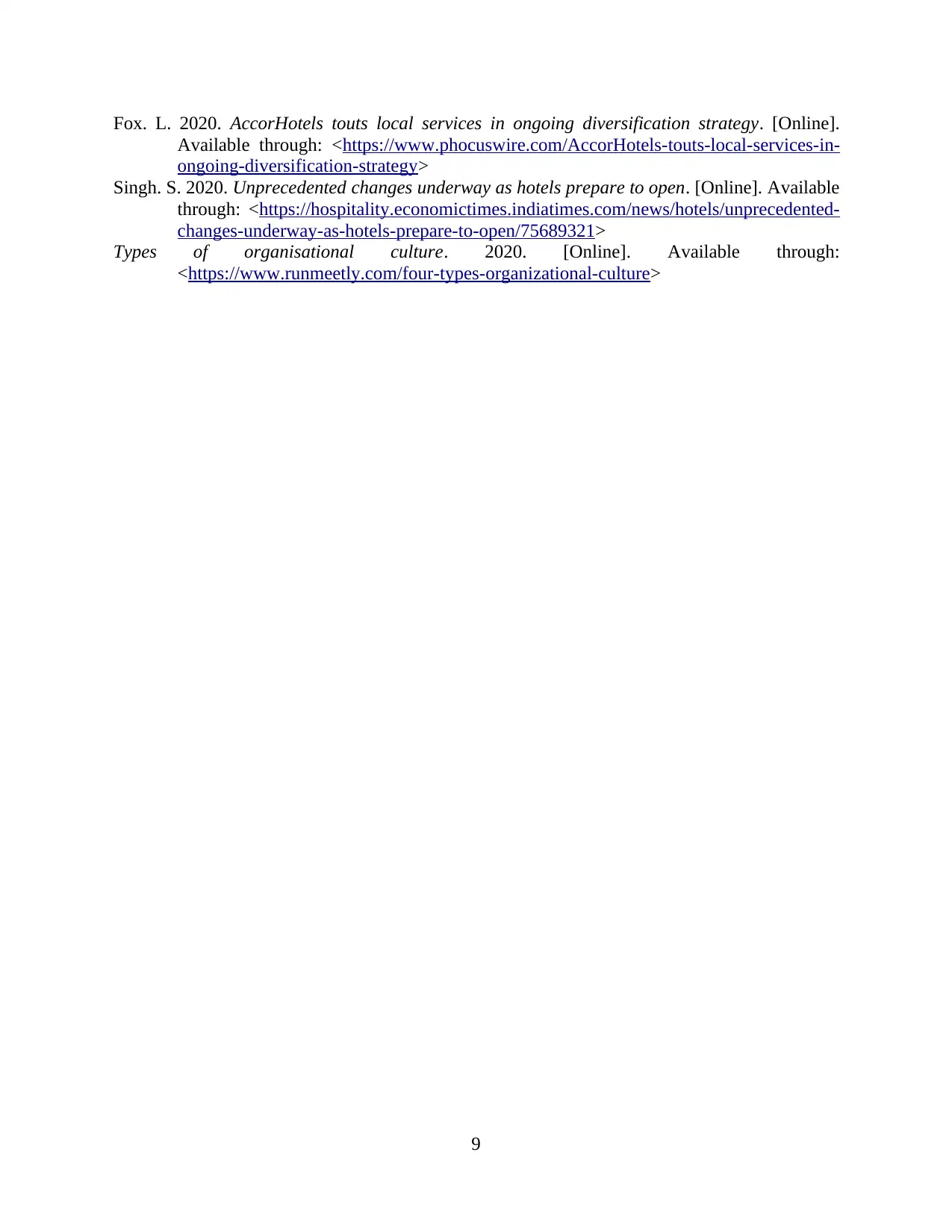
Fox. L. 2020. AccorHotels touts local services in ongoing diversification strategy. [Online].
Available through: <https://www.phocuswire.com/AccorHotels-touts-local-services-in-
ongoing-diversification-strategy>
Singh. S. 2020. Unprecedented changes underway as hotels prepare to open. [Online]. Available
through: <https://hospitality.economictimes.indiatimes.com/news/hotels/unprecedented-
changes-underway-as-hotels-prepare-to-open/75689321>
Types of organisational culture. 2020. [Online]. Available through:
<https://www.runmeetly.com/four-types-organizational-culture>
9
Available through: <https://www.phocuswire.com/AccorHotels-touts-local-services-in-
ongoing-diversification-strategy>
Singh. S. 2020. Unprecedented changes underway as hotels prepare to open. [Online]. Available
through: <https://hospitality.economictimes.indiatimes.com/news/hotels/unprecedented-
changes-underway-as-hotels-prepare-to-open/75689321>
Types of organisational culture. 2020. [Online]. Available through:
<https://www.runmeetly.com/four-types-organizational-culture>
9
⊘ This is a preview!⊘
Do you want full access?
Subscribe today to unlock all pages.

Trusted by 1+ million students worldwide
1 out of 12
Related Documents
Your All-in-One AI-Powered Toolkit for Academic Success.
+13062052269
info@desklib.com
Available 24*7 on WhatsApp / Email
![[object Object]](/_next/static/media/star-bottom.7253800d.svg)
Unlock your academic potential
Copyright © 2020–2026 A2Z Services. All Rights Reserved. Developed and managed by ZUCOL.





